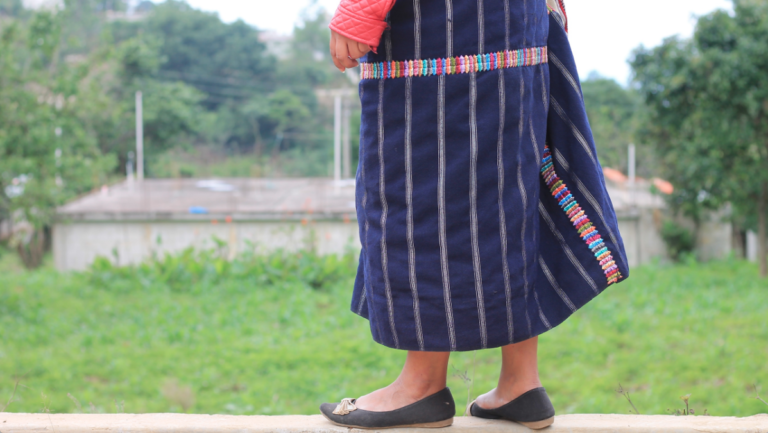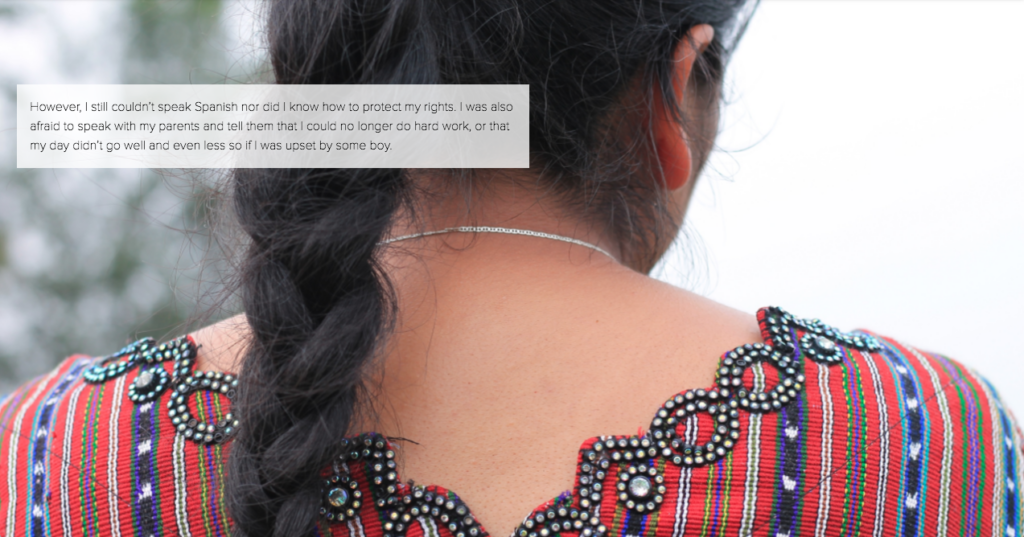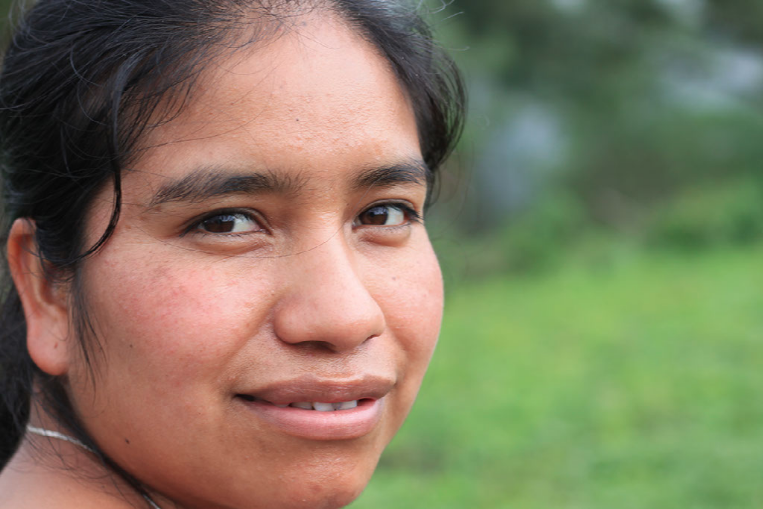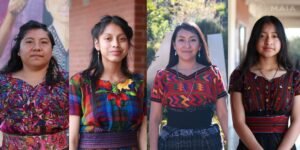
Transforming Futures: Amelia’s Story
Amelia was shy and reserved, but everything changed when she joined the MAIA Impact School. She broke the cycle and became the first daughter in her family to continue her

The MAIA and Girl Pioneers’ story
I am a twenty-eight year old woman living on the peak of a mountain from where I can see Lake Atitlán, how its waves hit the rocks of the other mountains that surround it. When it rains, most little boys and girls get their feet covered in mud and some carry firewood on their backs, walking close to their dogs who follow them like bodyguards.
When I see them work, I remember my own story. When I was eight years old, I went to the capital to do domestic work like make tortillas and clean houses. This made me nervous because people spoke to me in Spanish and my hands were too small for making the large and thin tortillas; I would shiver with cold during the mornings and during the day I would carry 25 to 30 pounds of corn on my head. I would also wash huge baskets of plates and clean ten rooms. It was very tiring for me.

One Friday after three months of working, I decided to return home because I was tired and needed to see my mother. Nervous, I spoke with my employer and told him how I was feeling. He gave me bus fare and declared that he wouldn’t have time to drop me off at the bus stop. I wanted to return home, although I almost died of fear since I didn’t know how to get to the stop.
I walked four blocks to get to the highway where the buses for Sololá pass by. I couldn’t see the cardinal directions, I just followed the sun. I crossed the footbridge and took one of the buses without any idea of where it was going and I got lost for three days.
I happily arrived at my house and saw my family husking corn, feeding the chickens, and cooking. Upon seeing me, my mother was shocked that I had come alone.
The next day, I accompanied her to the fields to clean onions. In spite of the work, at home, I felt free playing teacher with my dolls and throwing tea parties with my younger sister.
Months later, a friend in the community told me about an opportunity to bead bracelets in Panajachel on the weekends. During this time, girls only earned 5 quetzales (less than $1) a day and in this new type of work, I could earn 25 quetzales (about $3).

However, I still couldn’t speak Spanish nor did I know how to protect my rights. I was also afraid to speak with my parents and tell them that I could no longer do hard work, or that my day didn’t go well and even less so if I was upset by some boy.
Days later, my friend and I left. Due to my abilities and talents, that day I was able to turn in two or three dozen bracelets and necklaces and my friend was not able to reach this quantity. Sadly, she was fired.
My sixty-six year old employer and his wife told me they would look for better opportunities for me: they would either increase my salary or offer me work seven days a week.
With time, I no longer returned home. I stayed with my employer’s family the whole week. After fifty bracelets, a lot of work and trips to the market, my employer invited me out for a soda.
I don’t know when he took me to an uninhabited place and violated me. He did not let me leave for two weeks. I was frightened and locked in a dark room. Every time he drugged me he would rape me, and I became ill with a vaginal infection. After a few days, he decided to tell my parents out of fear that I would die. However, he asked my parents for a lot of money to get me out so that I could receive treatment. Confused, my parents paid and they got me out of that place, without knowing how to denounce the situation or what to do with respect to it.
In the same way, it hurts me to see young boys and girls working like I did when I was their age. Abandoned, malnourished children who cover the expenses of their parents. Parents who never know the setbacks and criticisms that their children are encountering. It is not only girls who are raped, but young boys can also suffer sexual aggressions. I think at that young age they still don’t have the capacity or knowledge to defend their rights.
At eight years old I wove beads, but now I weave knowledge and learnings of quality not quantity, of leadership and dedication, through my example of life.
I worry about the role of childhood in Guatemala and the fact that that child labor is a common theme in rural areas. The majority of parents declare that having children is wonderful, only because it is they who cover the costs of the home.
It is important to convince parents to fulfill their part and that they are responsible for their children’s needs.
MAIA supports Jerónima’s vision by ensuring young girls stay in school, learn about everything from nutrition to their civil rights, and have a stable support network they can count on. We work closely with families through our mentorship program to ensure that mothers and fathers are not left behind as their daughters move forward. Join us in building pathways for remarkable young women like Jerónima.

Jerónima Sulugui is a twenty-eight year old Guatemalan woman. She is a woman of many talents, who is hardworking, energetic, and has overcome many personal, family, and social challenges. She is a MAIA graduate and the first in her family to complete high school. In 2012, she began working at MAIA with a group of fifteen young girls, ages 14 – 16, giving mentorship and supporting them with their studies and through home visits. Jerónima now works as the Kaqchikel educator at the MAIA Impact School and is also part of the selection committee. Jerónima believes that self-formation is the way to help other young women achieve their goals so that they may be active leaders and seek development in their communities. Also, so that they know how to deal with their rights in life, as indigenous women, so that they may be free from violence, live autonomously, and appreciate their culture.
Translation and photography by Nami Patel– view original presentation

Amelia was shy and reserved, but everything changed when she joined the MAIA Impact School. She broke the cycle and became the first daughter in her family to continue her

At MAIA, education goes beyond the confines of traditional academics. The Socioemotional Mentorship and Family Engagement Program is central to MAIA’s educational model. It is a unique initiative designed to

Join us on this International Women’s Day in celebration not just of womanhood, but also of the transformative power that investing in women holds.

MAIA USA
Tax Identification Number (EIN) 68-0652444
Asociación MAIA
Tax Identification Number (NIT) 6896913-9.
Guatemala Office:
Km. 137, Caserío Xolbé,
Cantón El Tablón, Sololá, Guatemala
US Office:
1031 33rd Street, Denver, CO 80205